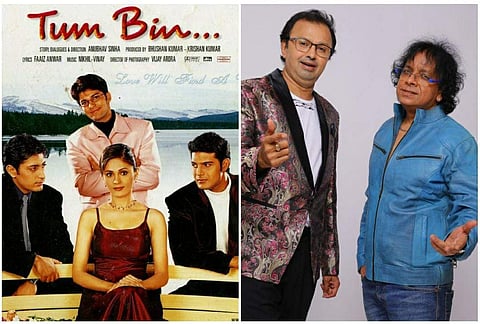20 years of Tum Bin: Nikhil Kamath reveals how Bhushan Kumar produced the movie's music as a challenge
It was 20 years ago on July 13 that Anubhav Sinha’s debut film Tum Bin starring Priyanshu Chatterjee, Sandali Sinha, Himanshu Malik and Raqesh Vashisth in leading roles hit the silver screen. Soon it was declared a musical hit with its songs Chhoti Chhoti Raatein, Koi Fariyaad, Tumhare Siwa and title track Tum Bin among others becoming immortal.
“In fact, at that point, four factories of T-Series were churning out the cassettes of Tum Bin only. They sold millions of copies,” recalls Nikhil Kamath who composed the music of the film with his long-time partner Vinay Tiwari.
The beginning
Sharing how the project came together, Nikhil, who had been closely associated with T-Series since 1991, says, “Anubhav Sinha had jokingly said it to Bhushan Kumar that ‘ki aap log sirf album hi karenge, kabhi picture nahi karenge (that you will only create musical albums and not films)’. Sometime later, Bhushanji called at 11 in the night saying that we are working on a movie called Tum Bin and called us over for a sitting (a term that refers to a meeting to put together music or film) that very night.”
Once everybody met, Anubhav Sinha gave a brief synopsis about the film and Nikhil-Vinay immediately suggested Chhoti Chhoti Raatein, a song penned by their long time collaborator, lyricist Faaiz Anwar.
“The story touched us, and we immediately suggested Choti Choti Raatein and Tumhare Siwa from our bank. While the former was ready, the latter was only a scratch tune at that point but they both got instant approval,” shares Nikhil.
Stating that ‘sometimes you don’t have to sit for long for something to click’, Nikhil went on to share how the entire music for the film came together very organically. “We had another sitting where Anubhav gave us the entire narration. There was so much trust that music started coming naturally. It was new territory for Bhushanji and he trusted us wholly,” adds Nikhil. Tum Bin was the first film that Bhushan Kumar produced. His father, Gulshan Kumar not only founded T-Series but also produced several Bollywood movies, including Aashiqui (1990), Dil Hai Ke Manta Nahin (1991) and Bewafa Sanam (1995). The latter’s music was also composed by Nikhil-Vinay.
Finding the right voice
Once the two songs got approval, Nikhil, Vinay and Faaiz started creating new songs keeping in mind the script. But, it was equally important to find the right voice. For instance, the duo got on board legendary ghazal singer Jagjit Singh because they wanted a mature voice for Koi Fariyaad.
“We were certain that we didn’t want a young voice, we needed someone who has seen life, and Jagjit Singh gave it a ghazal-like feel,” he says. Sharing an interesting anecdote, he immediately adds, “Jagjit Singh came to the studio several times and did multiple recordings. Whenever he would be in Andheri, he would call and ask me to come to the studio saying he wants to do another recording. By the end of it, I had about eight to ten versions of antara (main verse) and about seven to eight versions of the song’s mukhda (the stanza after antara). It took me 10 days to edit the song because I had so many versions of his voice.”
For the album, the composers worked with multiple singers, including Sonu Nigam, Udit Narayan, Anuradha Paudwal and Abhijeet Bhattacharya. It was during the recording of the song that they came across the lead actress of the film Sandali Sinha. “We noticed that she had a very sweet and thin voice and so we reached out to Chennai-based KS Chitra for the title track, Tum Bin. We rehearsed with her over the phone and upon reaching Chennai, Anubhav gave her the narration. She took notes of the situation and emotions and chose to confine herself to the studio even as the rest of the crew stepped out for lunch. And, once we were back, she sang the entire song in one take, leaving us all speechless. Such was her dedication,” recalls Nikhil, adding that one needs this level of commitment by everyone involved to make music that can be recalled decades later.
Musical blockbuster
“Two weeks after the release of the film, Bhushanji called us saying that ‘it is a super-duper blockbuster’. The music was in demand so much so that almost four T-Series factories were churning out cassettes of Tum Bin only. Later on, when Dil Chahta Hai released (August 2001), T-Series created a combination cassette featuring the music of Tum Bin and Dil Chahta Hai and it became a hit. It was a lethal combination and T-Series sold millions of copies, recalls Nikhil while admitting that they were expecting a good response but hadn’t anticipated the reaction that it got. “While making the music, we knew that good songs are being recorded. We also had a very strong gut feeling that Anubhav is making a good film and it will touch people but no, we didn’t know it will be remembered even after decades. When there are blessings, divine things happen. And, credit for this album goes to Bhushanji as he called all the shots.”
But was there a point when they felt stuck? “Meri Duniya Mein gave us a little problem because the lyrics had to suit the situation. We had Sonu Nigam sung the song but later, Anubhav wanted a female voice. Going to Chitra meant going back to Chennai again, which wasn’t feasible at that point. But then we thought of Shailaja Subramanian, a Mumbai-based singer who had a voice similar to Chitra. So we went to her and she sang the female version and did absolute justice,” concludes Nikhil.

